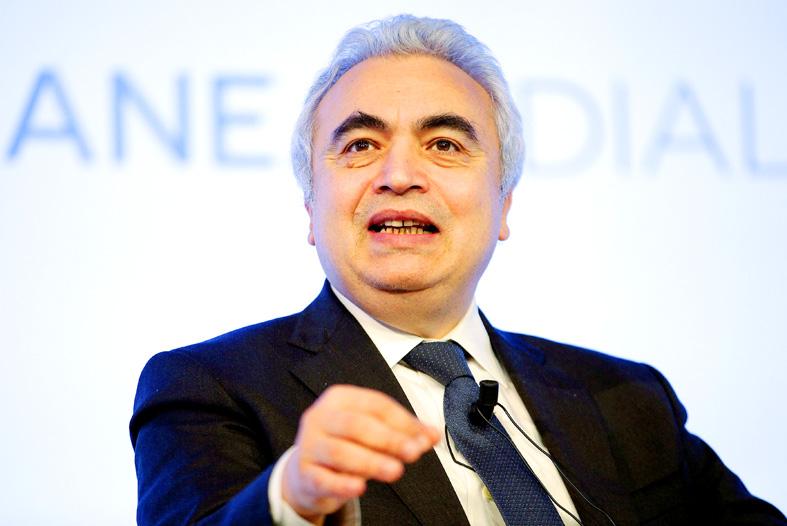The International Energy Agency (IAE) said the world could lessen an oil shortage caused by Russia’s invasion of Ukraine by restricting how people use their vehicles and accelerating the transformation of cities toward alternative means of transportation.
“We are experiencing a major crisis,” IEA executive director Fatih Birol told a news conference on Friday. “Oil markets are in an emergency situation. And not only that — it may even get worse than today in the next few months.”
The IAE said advanced economies could reduce their daily oil demand by 2.7 million barrels within four months by following a 10-step plan that would significantly ease looming supply strains by almost offsetting the loss of 3 million barrels per day from Russian production that the agency anticipates for April.

Photo: Reuters
“These efforts would reduce the price pain being felt by consumers around the world, lessen the economic damage, shrink Russia’s hydrocarbon revenues and help move oil demand to a more sustainable pathway,” the Paris-based agency said in a report.
Russian President Vladimir Putin’s invasion of Ukraine has upended global commodity markets, sending prices soaring and prompting an urgent search for alternative sources of energy.
While most states — excluding the US and UK — have not banned Russian oil imports, and none of its major customers are sanctioning natural gas supplies, there could still be disruptions as buyers voluntarily shun trade with Moscow.
The IEA’s plan to curtail oil demand includes lower speed limits for vehicles, urging people to work from home, placing occasional limits on vehicle access to city centers, making public transportation cheaper, encouraging carpooling, and greater use of high-speed rail and virtual meetings instead of air travel.
Earlier this month, the agency said the EU could slash imports of Russian gas by one-third within a year by increasing purchases from elsewhere, ramping up renewables and boosting energy efficiency.
In related news, the world’s three biggest oil field service providers are halting new projects in Russia in response to Moscow’s invasion, announcing their decisions separately within 24 hours of each other.
Baker Hughes Co on Saturday became the latest, saying in a statement that it is suspending new investment in Russia, but continuing with existing work there.
That followed a similar statement by Schlumberger NV late on Friday, when the world’s biggest oil field contractor immediately cut any new investment in one of the biggest oil-producing nations while leaving existing work there intact.
“The crisis in Ukraine is of grave concern, and we strongly support a diplomatic solution. We condemn violence and our hearts go out to the people and families of those impacted,” Baker Hughes chief executive officer Lorenzo Simonelli said in the statement.
Halliburton Co, the world’s top provider of fracking services, is the only oil field contractor to halt current and future work in Russia.
The company followed some of the largest oil explorers, including BP PLC and Shell PLC, in announcing plans to abandon Russia.

CHIP WAR: Tariffs on Taiwanese chips would prompt companies to move their factories, but not necessarily to the US, unleashing a ‘global cross-sector tariff war’ US President Donald Trump would “shoot himself in the foot” if he follows through on his recent pledge to impose higher tariffs on Taiwanese and other foreign semiconductors entering the US, analysts said. Trump’s plans to raise tariffs on chips manufactured in Taiwan to as high as 100 percent would backfire, macroeconomist Henry Wu (吳嘉隆) said. He would “shoot himself in the foot,” Wu said on Saturday, as such economic measures would lead Taiwanese chip suppliers to pass on additional costs to their US clients and consumers, and ultimately cause another wave of inflation. Trump has claimed that Taiwan took up to

A start-up in Mexico is trying to help get a handle on one coastal city’s plastic waste problem by converting it into gasoline, diesel and other fuels. With less than 10 percent of the world’s plastics being recycled, Petgas’ idea is that rather than letting discarded plastic become waste, it can become productive again as fuel. Petgas developed a machine in the port city of Boca del Rio that uses pyrolysis, a thermodynamic process that heats plastics in the absence of oxygen, breaking it down to produce gasoline, diesel, kerosene, paraffin and coke. Petgas chief technology officer Carlos Parraguirre Diaz said that in

SUPPORT: The government said it would help firms deal with supply disruptions, after Trump signed orders imposing tariffs of 25 percent on imports from Canada and Mexico The government pledged to help companies with operations in Mexico, such as iPhone assembler Hon Hai Precision Industry Co (鴻海精密), also known as Foxconn Technology Group (富士康科技集團), shift production lines and investment if needed to deal with higher US tariffs. The Ministry of Economic Affairs yesterday announced measures to help local firms cope with the US tariff increases on Canada, Mexico, China and other potential areas. The ministry said that it would establish an investment and trade service center in the US to help Taiwanese firms assess the investment environment in different US states, plan supply chain relocation strategies and

Japan intends to closely monitor the impact on its currency of US President Donald Trump’s new tariffs and is worried about the international fallout from the trade imposts, Japanese Minister of Finance Katsunobu Kato said. “We need to carefully see how the exchange rate and other factors will be affected and what form US monetary policy will take in the future,” Kato said yesterday in an interview with Fuji Television. Japan is very concerned about how the tariffs might impact the global economy, he added. Kato spoke as nations and firms brace for potential repercussions after Trump unleashed the first salvo of